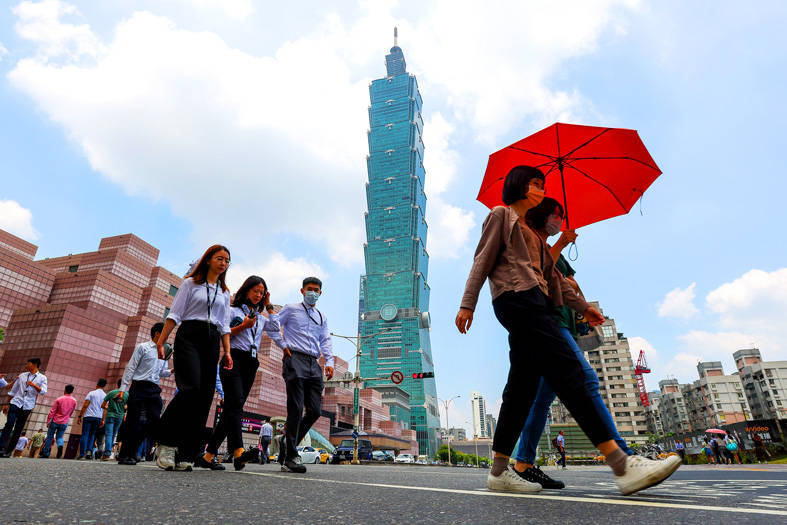《TAIPEI TIMES》 Heat raises risks of heart attack and stroke, doctor says

People walk under an umbrella amid high temperatures in Taipei yesterday. Photo: Ritchie B. Tongo, EPA-EFE
By Chiu Chi-jou / Staff reporter
The Ministry of Health and Welfare reported 236 cases of heat injury between July 1 and Saturday, twice the amount as the same period last year, but summer is also the peak period for acute cardiovascular events, the symptoms of which are often ignored given their similarity to heat injury, a doctor said on Sunday.
Heatstroke occurs when the body can no longer control its temperature as it rises above 40°C. The skin might turn red and dry and become hot, and the affected person might lose consciousness, the Health Promotion Administration (HPA) said.
Left untreated, heatstroke can quickly lead to shock, heart failure, multiple organ failure, rhabdomyolysis (rapid break down of damaged muscle tissue), disseminated intravascular coagulation (abnormal blood clotting) and other fatal complications.
Cathay General Hospital cardiovascular intensive care unit director Chang Chao-chien (張釗監) said that aside from heatstroke, heat causes blood vessels to widen, increasing blood flow and lowering blood pressure.
If a person sweats a lot, but does not drink enough water, their blood can thicken, causing increased risk of coronary or cerebrovascular occlusion, Chang said.
Drastic temperature changes, such as entering an air-conditioned room from a heated outdoor environment, can also increase blood pressure and the risk of cardiovascular events, he said.
Chest tightness and pain, cold sweats and shortness of breath are common symptoms of a heart attack, and severe symptoms include shock, an irregular heartbeat or sudden cardiac arrest, he said, adding that heat can cause sudden death.
People should seek immediate medical attention when experiencing these symptoms, he said.
Older adults are more prone to heatstroke when exposed to high temperatures and humidity, so they should drink plenty of water, avoid direct sun exposure to the skin, wear cooling clothing and stay in cool environments, to avoid dehydration, heat exhaustion and skin injury, doctors say.
The HPA said that older adults have reduced environmental sensitivity, and might collapse or lose consciousness before they are even aware of the early signs of heatstroke, but as the body temperature has risen too much, they might have brain damage or be at risk of death.
Moreover, many older adults take daily medication for chronic diseases, but it might affect blood flow or decrease their ability to sweat, limiting their body’s ability to dissipate heat, such as antihistamines for relieving symptoms of allergies, diuretics used in the management of hypertension, beta blockers and calcium channel blockers, it said.
Extreme heat can also worsen cardiovascular disease, forcing the heart to pump harder and beat faster to reroute more blood to the skin, and people with heart disease would be at higher risk of heart failure, it said.
In addition to drinking plenty of water and taking precautions when going out in the heat, older adults should also get regular health checkups, the HPA said.
When people notice signs of suspected heat injury, they should immediately leave the hot environment, try to lower their body temperature and seek medical attention, it said.
新聞來源:TAIPEI TIMES













